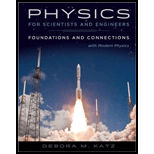
Concept explainers
(a)
The distance between the central maxima and adjacent maxima in the interference pattern in the screen.
(a)
Answer to Problem 87PQ
The distance between the central maxima and an adjacent maxima in the interference pattern in the screen is
Explanation of Solution
Write the relation of the path difference for bright fringe in young’s double slit experiment.
Here,
Write the equation of the angle made by the particular fringe from the central maxima.
Here,
For small angle
Substitute
Now, substitute
Substitute,
Conclusion:
Substitute,
Therefore, the distance between the central maxima and an adjacent maxima in the interference pattern in the screen is
(b)
The distance between the first and the third dark band of the interference pattern.
(b)
Answer to Problem 87PQ
The distance between the first and the third dark band of the interference pattern is
Explanation of Solution
Write the relation of the path difference for dark fringe in young’s double slit experiment.
Here,
Substitute,
Consider the equation (2).
Substitute
Calculate the distance between the first and the third fringe.
Simplify the above equation.
Conclusion:
Substitute
Therefore, the distance between the first and the third dark band of the interference pattern is
Want to see more full solutions like this?
Chapter 35 Solutions
Physics For Scientists And Engineers: Foundations And Connections, Extended Version With Modern Physics
- The cube is placed in a bucket of water and find that it floats, with 33% of its volume submerged below the surface of the water. What is the density of the mystery material? The material is uniformly distributed throughout the solid cube, with the number of kg/m3.arrow_forward2.82 A ball is thrown straight up from the ground with speed Up. At the same instant, a second ball is dropped from rest from a height H, directly above the point where the first ball was thrown upward. There is no air resistance. (a) Find the time at which the two balls collide. (b) Find the value of H in terms of un, and g such that at the instant when the balls collide, the first ball is at the highest point of its motion.arrow_forwardThe small piston has an area A1=0.033 m2 and the large piston has an area A2= 4.0 m2. What force F2 will the large piston provide if the small piston is pushed down with a force of 15 Newtons with an answer in Newtons?arrow_forward
- 2.23 BIO Automobile Airbags. The human body can survive an acceleration trauma incident (sudden stop) if the magnitude of the ac- celeration is less than 250 m/s². If you are in an automobile accident with an initial speed of 105 km/h (65 mi/h) and are stopped by an air- bag that inflates from the dashboard, over what minimum distance must the airbag stop you for you to survive the crash?arrow_forwardPlease solve and answer these problems correctly.Thank you!!arrow_forward2.2. In an experiment, a shearwater (a seabird) was taken from its nest, flown 5150 km away, and released. The bird found its way back to its nest 13.5 days after release. If we place the origin at the nest and extend the +x-axis to the release point, what was the bird's average ve- locity in m/s (a) for the return flight and (b) for the whole episode, from leaving the nest to returning?arrow_forward
- Use relevant diagrams where necessary and go through it in detailsarrow_forwardYour blood pressure (usually given in units of "mm of Hg") is a result of the heart muscle pushing on your blood. The left side of the heart creates a pressure of 115 mm Hg by exerting a force directly on the blood over an effective area of 14.5 cm2. What force does it exert to accomplish this? (Give your answer as the number of Newtons and note that you will need to do some unit conversions.)arrow_forwardWhat is the absolute (total) pressure experienced by a diver at a depth of 17 meters below the surface of a lake? Assume that atmospheric pressure at the surface of the lake is 101,000 Pascals, g= 9.8 m/s2, and the density of the water in the lake is 997 kg/m3. Give your answer as the number of Pascals.arrow_forward
- A particular solid cube has an edge of length 0.59 meters and is made of a material whose density is 3500 kg/m3. What is the mass of the cube? Give your answer as the number of kilograms.arrow_forwardSolve and answer correctly please.Thank you!!arrow_forwardA cart on wheels (assume frictionless) with a mass of 20 kg is pulled rightward with a 50N force. What is its acceleration?arrow_forward
 University Physics Volume 3PhysicsISBN:9781938168185Author:William Moebs, Jeff SannyPublisher:OpenStax
University Physics Volume 3PhysicsISBN:9781938168185Author:William Moebs, Jeff SannyPublisher:OpenStax Principles of Physics: A Calculus-Based TextPhysicsISBN:9781133104261Author:Raymond A. Serway, John W. JewettPublisher:Cengage Learning
Principles of Physics: A Calculus-Based TextPhysicsISBN:9781133104261Author:Raymond A. Serway, John W. JewettPublisher:Cengage Learning College PhysicsPhysicsISBN:9781285737027Author:Raymond A. Serway, Chris VuillePublisher:Cengage Learning
College PhysicsPhysicsISBN:9781285737027Author:Raymond A. Serway, Chris VuillePublisher:Cengage Learning Physics for Scientists and Engineers: Foundations...PhysicsISBN:9781133939146Author:Katz, Debora M.Publisher:Cengage Learning
Physics for Scientists and Engineers: Foundations...PhysicsISBN:9781133939146Author:Katz, Debora M.Publisher:Cengage Learning College PhysicsPhysicsISBN:9781305952300Author:Raymond A. Serway, Chris VuillePublisher:Cengage Learning
College PhysicsPhysicsISBN:9781305952300Author:Raymond A. Serway, Chris VuillePublisher:Cengage Learning Physics for Scientists and Engineers with Modern ...PhysicsISBN:9781337553292Author:Raymond A. Serway, John W. JewettPublisher:Cengage Learning
Physics for Scientists and Engineers with Modern ...PhysicsISBN:9781337553292Author:Raymond A. Serway, John W. JewettPublisher:Cengage Learning





